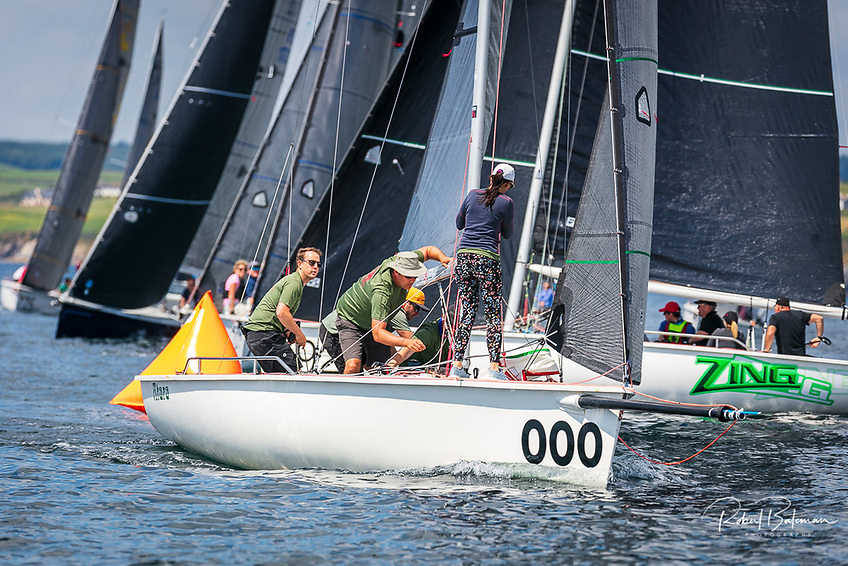Displaying items by tag: Ivor Davies
Tributes have been paid to former Dun Laoghaire Motor Yacht Club (DMYC) sailor Ivor Davies who has died in Rosslare, Co Wexford.
Davies was a familiar face and voice in Dublin Bay when sailing, principally with the late Arthur Reynolds.
Born in Battersea in 1932, Davies had moved to Southall as a young child, and left school early. He spent time as a radar technician in the Royal Air Force (RAF), and met his wife, Mary Mahon from Co Wexford, while they were both working at Ultra Electronics in Greenford, Middlesex.
Ivor went on to work for 3M as a photocopier salesman. When 3M later offered Ivor a promotion to a post in Ireland, he felt it was too good an opportunity to turn down.
He and Mary, who was also a semi-professional singer, lived in Ireland for over 50 years, and Davies took up sailing while they were in Kilmacanogue, Co Wicklow.
He undertook a number of cruising trips with Reynolds – including several legs of a round Ireland circumnavigation for an Irish Times feature series, commissioned by the late Caroline Walsh, on Reynolds’s yacht, Gulliver, in 1995.
 Ivor Davies (on right) with Fintan Reynolds, sailing in Dublin Bay
Ivor Davies (on right) with Fintan Reynolds, sailing in Dublin Bay
Davies was remembered particularly for his energy, agility, eternal optimism and quick wit.
Brian Byrne, who sailed with him on both Blue Fin and Gulliver, said that he had “such fond memories of him…from wondering if he was really holding that line while I dangled aloft soldering radar connectors, to the terrifyingly stern bark he could emit if a young lad like me was about to do something foolish!”
“I remember a kind, witty, caring and friendly man who has travelled with me in my memories in the many years since, and will continue to do so,”Byrne said, wishing him “fair winds”.
Also wishing him “fair winds” was DMYC Fireball dinghy sailor Frank Miller, who was Irish Times photographer on the 1995 circumnavigation for the newspaper.
“ We passed on Gulliver, like ships in the night...you were Arthur's trusted seaman and any friend of Arthur's was and is a friend of mine,”Miller wrote on Rip.ie
DMYC member Conor Fennell said that he “enjoyed Ivor's wonderful company with Arthur on a night voyage in Blue Fin to the Isle of Man, returning in a strong following wind”.
“It was my first "foreign" sail, and I was nervous, but Ivor's entertaining company soon put me at ease,”Fennell said.
The Davies couple moved to Co Wexford, latterly to Rosslare Harbour. In October 2019, they chose to celebrate their 60th wedding anniversary in their local hotel, then being used as emergency accommodation for asylum seekers, in solidarity with migrants coming to Ireland.
The couple said they also wanted to mark their diamond anniversary in the Hotel Rosslare as a gesture of support for the hotel which they say is a vital part of their local community.
Davies told Irish Times journalist Sorcha Pollak that he had become frustrated by the “begrudgery” towards both asylum seekers and the hotel owners who choose to accommodate them while they await on a decision on their application for international protection.
Davies recalled that while growing up in Britain in the 1930s and 40s, he had been taught to distrust foreigners and recalled the cardboard notices outside buildings which stated that “no Irish, no blacks, no dogs” were allowed inside. Later, he watched xenophobia develop towards the Indian and Pakistani families who arrived in the country.
He explained that his attitude changed after time in the military, and moving to Ireland to live.
“I don't care who you are and where you're from. I accept now that we all deserve to have a life. I have a different viewpoint all together now on migrants. I'm a migrant, I came here from Wales and England,” he told The Irish Times.
Ivor Davies, who was buried beside his wife Mary in Our Lady’s Island, Co Wexford, is survived by his brother, Trevor, nephews and nieces and extended family.




























































